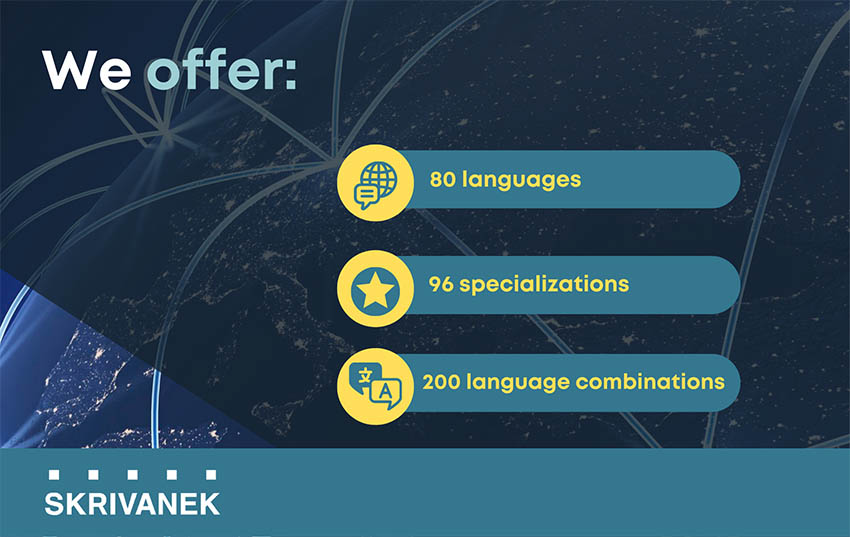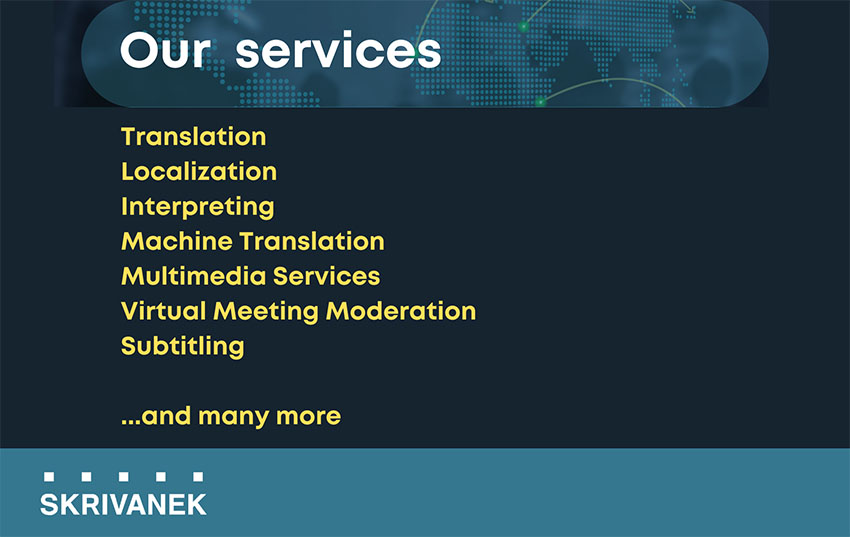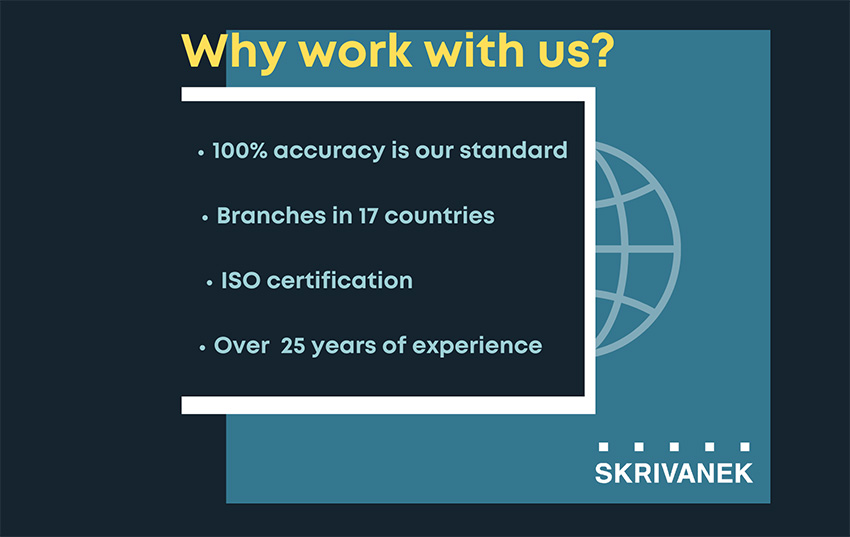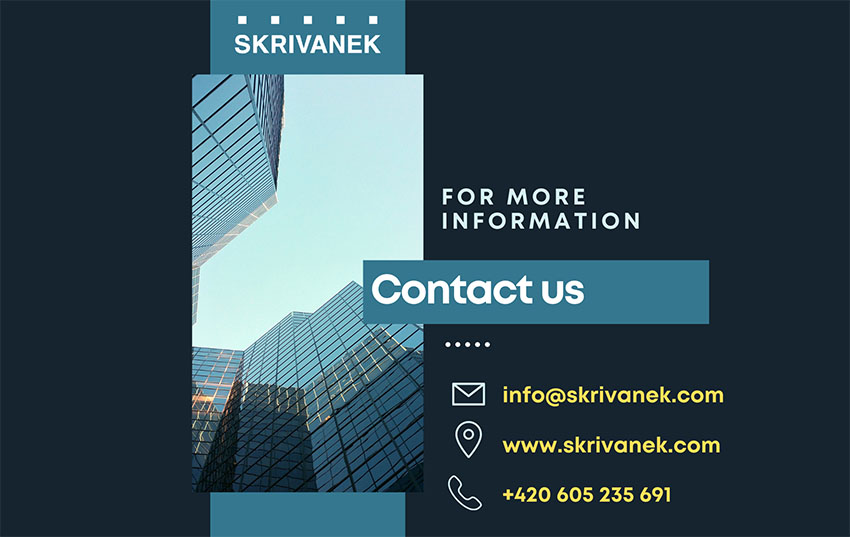Skrivanek is a language service provider (LSP) that has been building a global network for almost 30 years, with a staff of about 300 language professionals in 17 countries. The company offers every type of language service for global companies, from basic translation of texts to localization of multimedia. Skrivanek maintains their own Research and Development Department that is part of their International Project Management Center (IPMC), and coordinate the talent and technology to service over 200 languages.
Easy Engineering: Which are the most futuristic products/solutions from your portfolio?
SKRIVANEK: Artificial Intelligence (AI) is definitely generating futuristic language service products. Machine Translation, for instance, provides instant translations with a simplicity that would have seemed like science fiction a few decades ago.
Other futuristic AI tools that are already available in the language industry are enhanced translation memory, translation management systems, automated content enrichment, intelligent terminology management, and adaptive neural machine translation. These tools will continue to evolve and may someday exponentially increase the amount of translated material it’s currently possible to produce, even as they also continue to decrease cost and increase accuracy.
Synthetic voiceover that does not require a human voice actor is another new tool that is likely to keep getting more flexible and lifelike; already it is available and just right for some types of projects.

E.E: What are the characteristics of these products/solutions?
SKRIVANEK: More words can be translated, more projects can get done, and quality is more consistent.
They are tools operated by human language service professionals, assisting rather than replacing. The best are complex and require significant investment and training. They enable outreach to people in all corners of the earth, for both business and humanitarian needs.
E.E: Tell us about the company’s long-term goals and prospects.
SKRIVANEK: We are extremely responsive to our clients’ specific needs and this often prompts the development of new services, even the purchase of new technology. Basically, our long-term plan is to continue to meet the needs of our global clients while simultaneously guiding them toward newer and better practices. The language industry is changing so rapidly it is hard to forecast just what this will look like year to year. It’s a very exciting time.
E.E: Tell us about product innovation and how it impacts the future.
SKRIVANEK: Language product innovations are changing human communication. What will the effect on languages be of digitization, emoticons, bots, and other communication features? We are in the middle of this communication revolution, all of us can see it, but the only certainties are that the future landscape of communication will be dynamic, rapidly evolving, and multilingual. Product innovations drive this process and changes give rise to more product innovations.

E.E: How will product innovation help the customers?
SKRIVANEK: The easier and more efficient and affordable language services are, the greater the numbers of customers that will seek LSP products. With the innovations we have seen so far, every size company can afford to translate their website for foreign markets, and already many companies are in a position where they can’t afford not to.
Ironically, this benefit has a competitive downside. With innovation happening so quickly, and with so much content being produced for both home and foreign markets, everyone has to continually generate content and employ innovative technologies (such as multimedia features in their advertising) in order to keep up with their competitors.
E.E: How do employees shape your company’s future orientation?
SKRIVANEK: Our employees are without question at the center of our orientation toward the future. They come up with ideas and we support them, request new technologies and we invest in them. They listen to our customers and develop creative new ways to serve them. This is a distinctive characteristic that defines Skrivanek and accounts for our exceptional customer service.
E.E: How does the digital transformation affect your products/business?
SKRIVANEK: The digital transformation is literally driving the evolution of language services and products at this point. Here’s one example of a fundamental shift that amounts to a change in how we think: the transition is well under way from creating written translations first and then transcreating those messages for the digital realm second. There are times now when we ask if development of a localization project (such as a marketing campaign for a new country) should even start with text, or should the first communication be images and video?

E.E: Tell us about research and development in your company.
SKRIVANEK: We have one key tech person at Skrivanek who investigates how new technologies might improve translation results. Basically, that means looking for technology that can raise quality, shorten the time needed to complete tasks, and lower costs. This person monitors trends and new approaches to standard services, such as transcription technology and text-to-speech options.
A major R&D achievement for us has been the development of our own Project Management (PM) system. We looked at existing systems over the years but we weren’t able to find one that suited all the different departments at Skrivanek. Because we have our core translation work, but we also have a language school, interpreting jobs, and multimedia projects, and the processes and resources needed for each of these are different. Either we would have to make large investments to change an existing tool like Plunet or xtrf, or we would need to buy different tools for different tasks. So we developed our own PM system and we adapt it for different uses.
On the other hand, when dozens of tools exist for specific tasks like transcription, investment in developing our own isn’t cost efficient, so we select existing ones.
E.E: How do you overcome the new challenges and this more competitive environment?
SKRIVANEK: We focus on efficient project management; further refinement of our PM tool to ensure that time is not wasted on administration; optimal use of technology; and adding new services to our portfolio.

E.E: Tell us about the company’s future strategies and how you will adapt to the future.
SKRIVANEK: Our current business model is working very well for us and for our clients, so we will continue doing what we are doing, expanding our resources as needed. To some extent this means that we are transitioning into a company focused on mastering every available technology that might improve our services.
And our most important strategy for the future is to maintain Skrivanek’s sophisticated customer service. That is, we consider ourselves to be more than just vendors of language services – we have knowledge and experience that allow us to be highly effective consultants to our clients. When we discuss their needs and vision we do not speak simply of our various services, but together brainstorm the cheapest, most effective language solutions for every project, in every target language.

